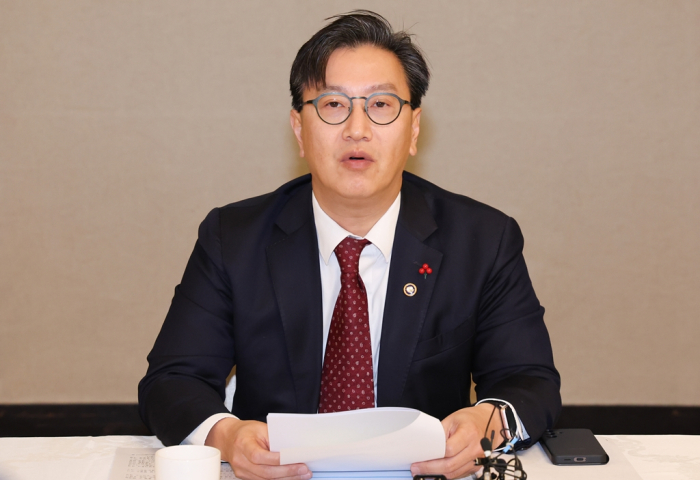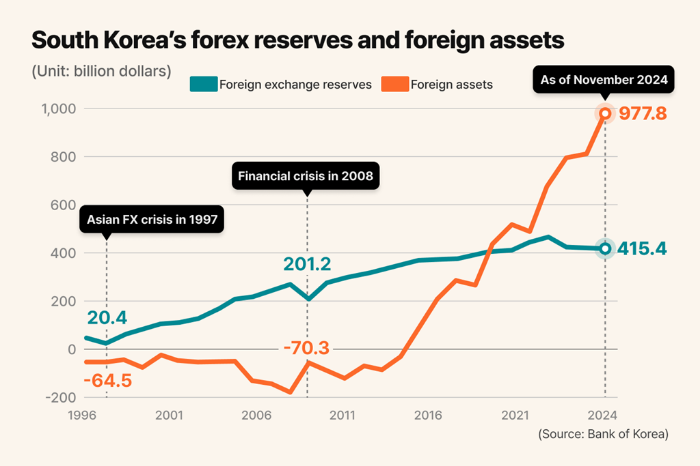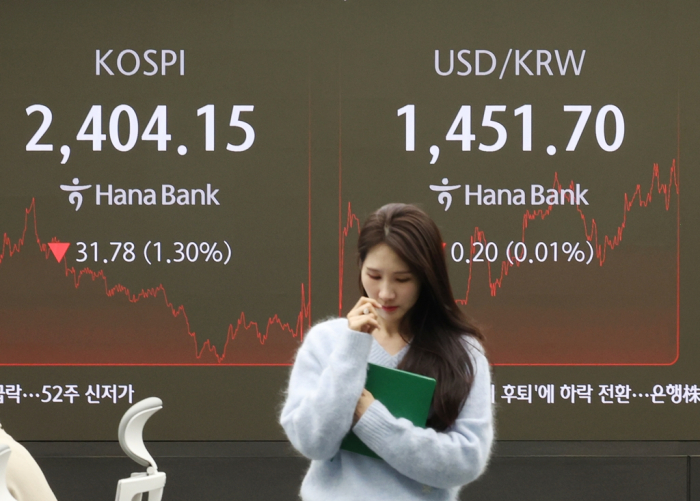Foreign exchange
South Korea to ease foreign exchange regulations, expand FX swap line
The government expects the new rules to support corporate borrowings abroad and defend the won versus the greenback
By Dec 20, 2024 (Gmt+09:00)
4
Min read
Most Read
LG Chem to sell water filter business to Glenwood PE for $692 million


Kyobo Life poised to buy Japan’s SBI Group-owned savings bank


KT&G eyes overseas M&A after rejecting activist fund's offer


StockX in merger talks with Naver’s online reseller Kream


Mirae Asset to be named Korea Post’s core real estate fund operator



South Korea’s foreign authorities said on Friday they will ease foreign exchange regulations to allow more dollars into the domestic financial market, a day after the Korean won fell to its weakest level against the greenback in more than 15 years.
While unveiling a spate of measures aimed at improving foreign currency liquidity in the local market following an emergency economy-related government meeting, the Ministry of Economy and Finance said it would “closely monitor the foreign exchange market and gauge the impact of the new measures” before further loosening foreign currency rules.
The meeting, chaired by First Vice Finance Minister Kim Beom-seok, was attended by senior officials from the Financial Services Commission, the Financial Supervisory Service and the Bank of Korea.
Government officials said easing foreign exchange regulations would facilitate corporate and bank borrowings abroad and help defend the won’s fall against the dollar.
On Thursday, the Korean currency dropped to its weakest level in 15 years, weighed down by risk-averse sentiment after the US Federal Reserve's cautious stance on more interest rate cuts, as well as domestic political uncertainty stoked by President Yoon Suk Yeol's short-lived martial law order on Dec. 3 and his subsequent impeachment.

Earlier on Thursday, the won fell to 1,453.0 per dollar – its weakest since March 16, 2009, before recouping losses and ending the day at 1,452.0 in Seoul trade. On Friday, the won closed at 1,451.7 per dollar in the domestic market.
The won, down 11% year-to-date, is the worst-performing emerging Asian currency of the year. Currency dealers said the local currency is heading toward its worst year since 2008.
TO LIFT CEILINGS OF FX FORWARD FUTURES POSITIONS
Under the measures announced on Friday, the ceiling of forward foreign exchange futures positions will be raised to 75% of capital holdings for local banks and 375% for Seoul branches of foreign banks, from the current 50% and 250%, respectively.
The forward exchange position refers to the difference between forward foreign currency assets and liabilities.
The government is lifting the ceilings for the first time since the policy to do so was introduced in 2010.
Easing the limits is expected to help lenders more efficiently secure foreign currency liquidity, the ministry said.
Hit hard by capital flight during the 1997-1998 Asian foreign exchange crisis and the 2007-2008 global financial crisis, Korea has kept a tight grip on foreign exchange borrowings even as it has encouraged overseas investments.

At the end of November, the country held a record-high net $977.8 billion in foreign assets abroad, after turning a net creditor in 2014. Its foreign exchange reserves stood at $415.4 billion last month.
DOLLAR LOANS FOR FACILITY INVESTMENT
The government will also allow companies to take out loans in foreign currencies and exchange the funds for Korean won if the loans are used for investing in facilities such as equipment, property and land purchases.
Small business owners, with exposure to higher foreign exchange risks, will be excluded from the new measures.
The ministry said it would expand non-dollar trade settlements by allowing companies to settle business transactions with partner country currencies.
To assist domestic companies in raising overseas capital, the government plans to simplify procedures for issuing bonds on the Luxembourg Stock Exchange, known as LuxSE.
“Strict regulations restrain the efficiency of foreign exchange management, and there is a need to take into account worsened foreign exchange liquidity conditions after recent events," the finance ministry said in a joint statement with the central bank and financial regulators.

FX SWAP LIMIT HIKED, STRENGTHENED FX STRESS TESTS DELAYED
Moreover, the foreign exchange swap limit between the Bank of Korea and the National Pension Service will increase from the current $50 billion to $65 billion, with the maturity of existing swap contracts extended to the end of 2025 from the end of this year.
Strengthened regulations on foreign currency liquidity stress tests, introduced in June, will be deferred.
Since June 2011, the Financial Supervisory Service has conducted stress tests to assess financial institutions' foreign currency liquidity under crisis scenarios.
The regulatory body began implementing stricter stress test standards this June. However, punitive measures for institutions failing to meet the new criteria will be delayed to June 2025 from the end of this year.
The delay is expected to provide financial institutions sufficient time to adapt to the new standards while maintaining market stability, according to the joint statement.
“Increased FX loans are expected to enhance FX liquidity in the market, potentially lowering the Korean won-US dollar exchange rate,” said a ministry official.
Write to In-Soo Nam at isnam@hankyung.com
Jennifer Nicholson-Breen edited this article.
More to Read
-
 Central bankS.Korea’s c.bank chief sees limited impact of political turmoil on economy
Central bankS.Korea’s c.bank chief sees limited impact of political turmoil on economyDec 18, 2024 (Gmt+09:00)
2 Min read -
 Business & PoliticsKorea’s president impeached over martial law; political turmoil to ease
Business & PoliticsKorea’s president impeached over martial law; political turmoil to easeDec 14, 2024 (Gmt+09:00)
3 Min read -
 Business & PoliticsSouth Korea’s sovereign credit rating stable: S&P, Moody's, Fitch
Business & PoliticsSouth Korea’s sovereign credit rating stable: S&P, Moody's, FitchDec 13, 2024 (Gmt+09:00)
2 Min read -
 Business & PoliticsS.Korea's Yoon survives impeachment; economic fundamentals firm
Business & PoliticsS.Korea's Yoon survives impeachment; economic fundamentals firmDec 07, 2024 (Gmt+09:00)
4 Min read -
 Foreign exchangeKorea FX authorities, NPS raise currency swap limit to $50 bn
Foreign exchangeKorea FX authorities, NPS raise currency swap limit to $50 bnJun 21, 2024 (Gmt+09:00)
1 Min read
Comment 0
LOG IN


